What Does it Mean to be 'Religious'?
Behavior, Belief, Belonging and the Problem of Religiosity
This post has been unlocked through a generous grant from the Lilly Endowment for the Association of Religion Data Archives (ARDA). The graphs you see here use data that is publicly available for download and analysis through link(s) provided in the text below.
I have learned a very valuable lesson when it comes to social media - the people who inhabit the replies of one website are not at all the same as the people on a different website. I will give you a quick example.
Threads may be the most anti-religion social network on the internet. From my experience, the only one that may compete with Threads is Reddit. Let me give you an example of why I believe this about Threads.
I posted the following graph and text on Threads (which I had just copied and pasted from Twitter.)
The responses on Threads were less than encouraging. People questioning my character, they questioned the data, they came up with lots of reasons to explain this finding away. There was a pattern in the responses that I think is indicative of a bigger issue when it comes to religion. Here’s one example of that:
Notice the subtle (but significant) difference in my initial post and this response. My data is focused on one aspect of religion - attendance. The post from “dathinkyparts” is focused on another aspect of religion - belonging. Those are two dimensions of the larger concept of religiosity. My claim can be true and so can this one from Pew. They are certainly not mutually exclusive.
Consider this post as a little mini-lecture about how academics think about the measurement of religiosity. And also check out this module from the ARDA with a bunch more information about measuring religiosity.
The most widely accepted approach is called the three B’s:1
Behavior - this is almost always measured by religious attendance
Belief - this is measured in a variety of ways including view of the Bible, belief in angels, demons, God, heaven, hell, etc.
Belonging - this is what group you identify with on a survey - Protestant, Catholic, Jewish, Muslim, No Religion, etc.
(ARDA has great database on a bunch of possible measures of each of the three B’s, by the way. You can access that here.)
It is most certainly possible to score very high on one of these measures of religiosity and very low on another one. Some people who don’t believe in God still attend religious services. Some people who are evangelical Protestants never attend religious services. You can think of a thousand combinations of just these three variables when it comes to religiosity.
What I wanted to lay out for you in this post is some metrics of religiosity based on these three separate dimensions to provide a sense of how hard this can be. And how taking just a slightly different measurement approach can lead to a very different answer to a basic questions like: What percentage of Americans are religious?
So, let’s start broad. Three questions I picked up here from the General Social Survey.
How often do you attend religious services? Here, I coded people who chose “never” as 1, and everyone else who answered the question got coded as zero.
What is your religious preference? Is it Protestant, Catholic, Jewish, some other religion or no religion? Those who chose no religion (Option 4) were coded as 1, and everyone else who answered the question was coded zero.
Which statement comes closest to expressing what you believe about God? Everyone who said, “I don’t believe in God” or “I don't know whether there is a God, and I don't believe there is any way to find out” were coded as 1, and everyone else was coded as a zero.
Here’s the share who don’t behave or don’t belong or don’t believe in God over the last several decades.
Let me get this out of the way. The belief question was introduced in 1988 and has not been asked every single survey wave since then, that’s why there are so many fewer data points. However, the share of Americans who don’t believe in God was very low for a long time. It vacillated between 5% and 8% of the sample until the late 2000s. It has been rising in the last few surveys, though. It jumped above 10% by 2016 and then jumped big time to 16% in 2021, but then settled back to 14% in 2022. I think it’s fair to say that about 15% of folks express an atheist or agnostic belief in God.
As far as belonging, well I’ve written a book (or two) about that. The nones were about 5% of America in 1972. They rose a single percentage point over the next two decades. From the 1990s onward, the nones just continued to rise. They hit 28% of the sample in 2021, but then they dipped a single percentage point in the 2022 data (a finding that is corroborated by other data sources, as well.) Today, it’s fair to say that the share of Americans who are nones by belonging is below 30%. My best guess is 27-28%.
As far as being non-religious by behavior- that’s a different story. In the early 1970s, the share of Americans who reported never attending religious services was in the low teens. It didn’t consistently get to 15% until the early 1990s. By 2008 or so, that figure was above 20% and then in the last two survey waves it went above 30%. The reported share of never attenders in 2021 was 31%. It nudged a bit higher in 2022 to exactly one third of the sample.
So - the share of non-religious Americans could be 15% by one metric, 28% by another metric, or 33% by another. A simple question doesn’t always warrant a simple answer.
For fun, let’s just combine all three of these groups. I calculated the share of people who express an atheist/agnostic view of God, report no religious affiliation, and indicate that they never attend religious services. For those who didn’t answer all three of these questions in a specific survey, they were omitted from the analysis.
In 1988, just one in fifty adults were none-none-none. That number stayed about the same for the next dozen years. It slowly began rising in the early 2000s. By 2012, it was about 5% of Americans who met all three criteria. In 2018, it rose to 6% but then it took a huge leap in 2021 to 11%, only to decline to 8% in the 2022 sample.
For what it’s worth, I am fairly convinced that there are major problems with the 2021 sample of the GSS that relate to how the survey was conducted that picked up a larger share of non-religious Americans. I have a lot more confidence in that 2022 number. It makes sense from a trend line perspective. To go from 6% in 2018 to 8% in 2022 is not a huge leap. To go from 6% to 11% in three years is a bit less plausible.
How about the opposite question - what share of Americans are religious on all three dimensions? This is the part of the sample that says:
They believe in God without any doubts
They attend religious services nearly every week or more
They are not “nones” - i.e. they indicate any religious tradition at all (Catholic, Muslim, Buddhist, Protestant, etc.)
Even back in the early 1970s, the vast majority of Americans did not fit this simple three part criteria. The high water mark was in 1993, when about 30% of the sample were religious on belief, behavior, and belonging measures at the same time. Over time that figure declined, but slowly. It was still about a quarter of the sample all the way through 2016, honestly.
But in the last couple of years things have turned downward in a noticeable way. By 2018, the percentage was 22%. It dropped again in both 2021 and 2022. Now, about one in five Americans are religious on all three dimensions, while about 8% are non-religious on all three. When I say that most Americans are in the middle of the religious distribution - this what I’m talking about.
But let me just put a really fine point on this by doing some analysis that will clearly indicate that some people can be very non-religious on one metric but very religious on another one. I isolated the sample to just people who never attend religious services. Here’s what they believe about God:
Seventeen percent of the sample of never attenders take an atheist view of God and another 16% take the agnostic position. In other words, only one third of never attending Americans do not believe in God at some level. In fact, one quarter of people who never attend a house of worship express a certain belief in God. This is a perfect example of believing without behaving. It may seem contradictory to some, but it makes perfect sense to a lot of average Americans. They don’t see any tension in believing in God but never expressing that through organized religion.
But let’s keep that belief question but sub out the behavior question for a belonging one. Usually, the GSS doesn’t ask what type of none people are. But they did in 2021. (That’s a fun little nugget to understand, by the way. A researcher cannot use the GSS to figure out the share of Americans who are atheists because it’s only asked in one survey wave.)
I took that single question about type of nones: atheist, agnostic, or nothing in particular. Then I looked at how each of those three groups answered the question about religious belief. Here’s the result of that:
Among atheists, zero percent expressed a certain belief in God. Which is comforting, but I wouldn’t be surprised if one or two snuck in there. In fact, 70% of atheists by belonging were also atheists by belief. But the corollary to that is that 30% of people who say that they are atheists did not say, “I don’t believe in God.”
Among agnostics, it’s even wilder. There’s a specific option for the agnostic viewpoint in the belief question - “I don't know whether there is a God, and I don't believe there is any way to find out,” but less than half of self-identified agnostics chose that one. Nine percent of agnostics said that they didn’t believe in God. That does mean that over half of agnostics didn’t express a belief in God, but 45% said that they believed in God at some level.
The “nothing in particular” category is a bit odd, too. Among this group, 8% took an atheist view and 22% chose the agnostic option. So, about 30% of people who claimed no religion in particular did not believe in God. Meanwhile nearly 20% expressed a certain belief in God and the same share said, “While I have doubts, I feel that I do believe in God.”
One of my least favorite attributes of academics is that we can get a bit pedantic. I try to avoid that as much as possible. But when I hear someone say, “<BLANK> makes people more religious.” My first response is always - what kind of religion are we talking about? Is it behavior, belief, or belonging? They aren’t the same things.
Hope you read carefully. Test on Monday.
Code for this post can be found here.
The credit for this scheme traces back to some of the most influential scholars of religion and politics from the prior generation - Jim Guth, John C. Green, Lyman Kellstedt, and Corwin Smidt




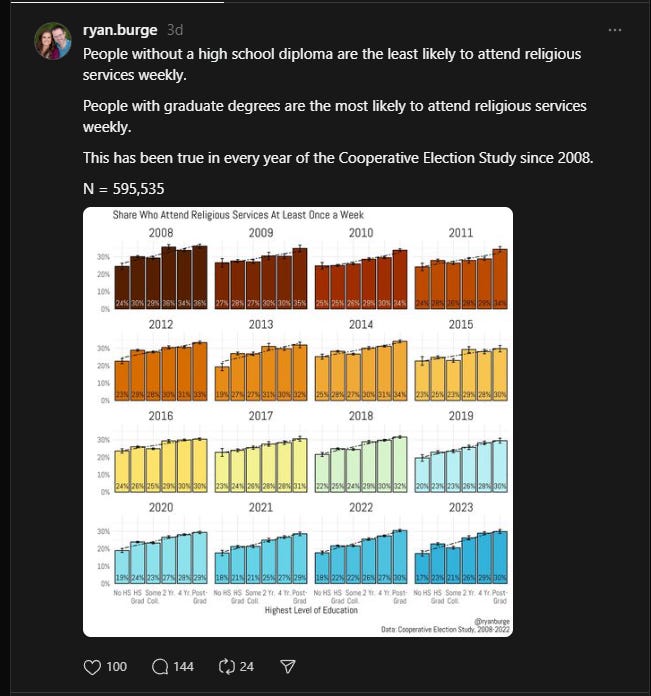

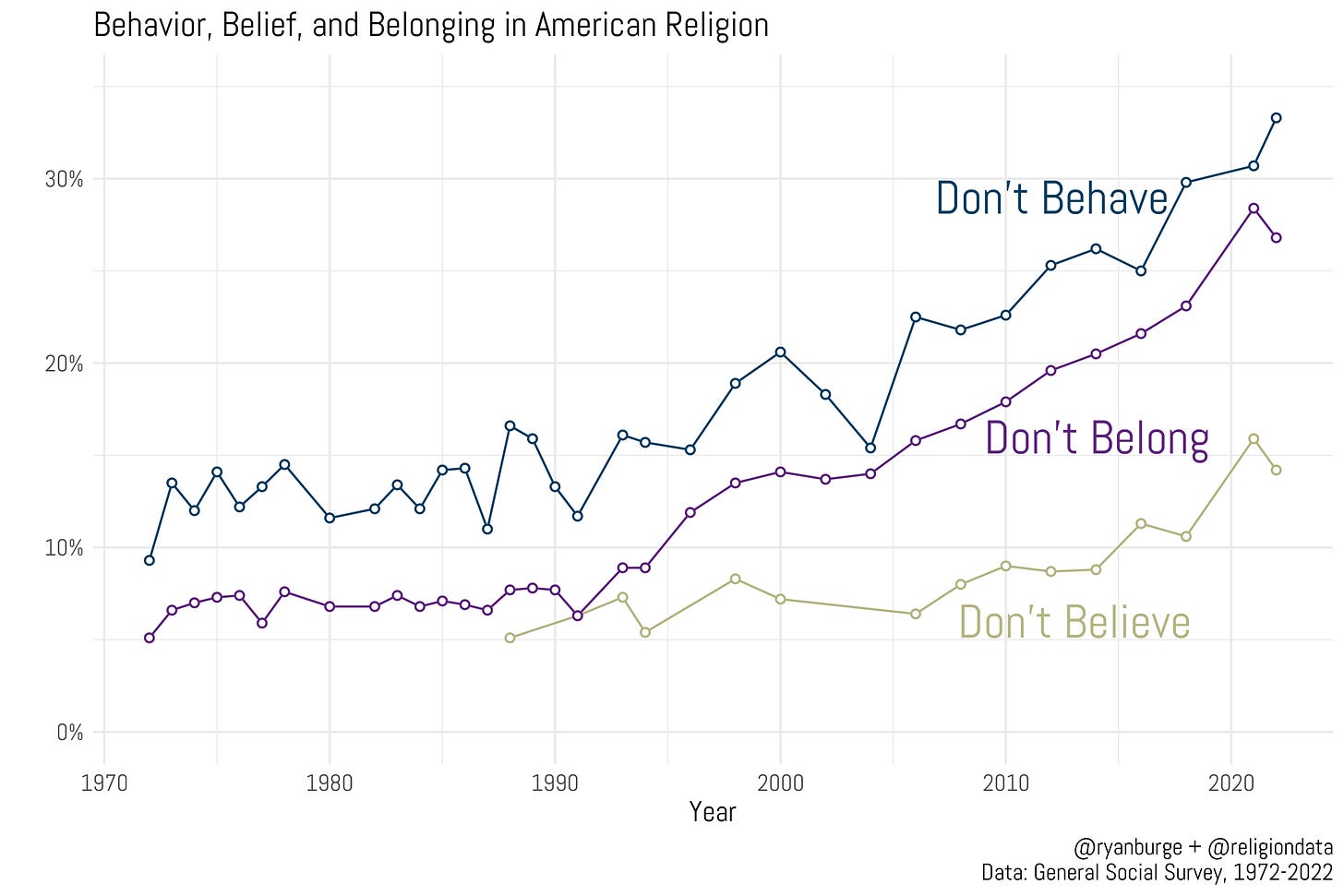
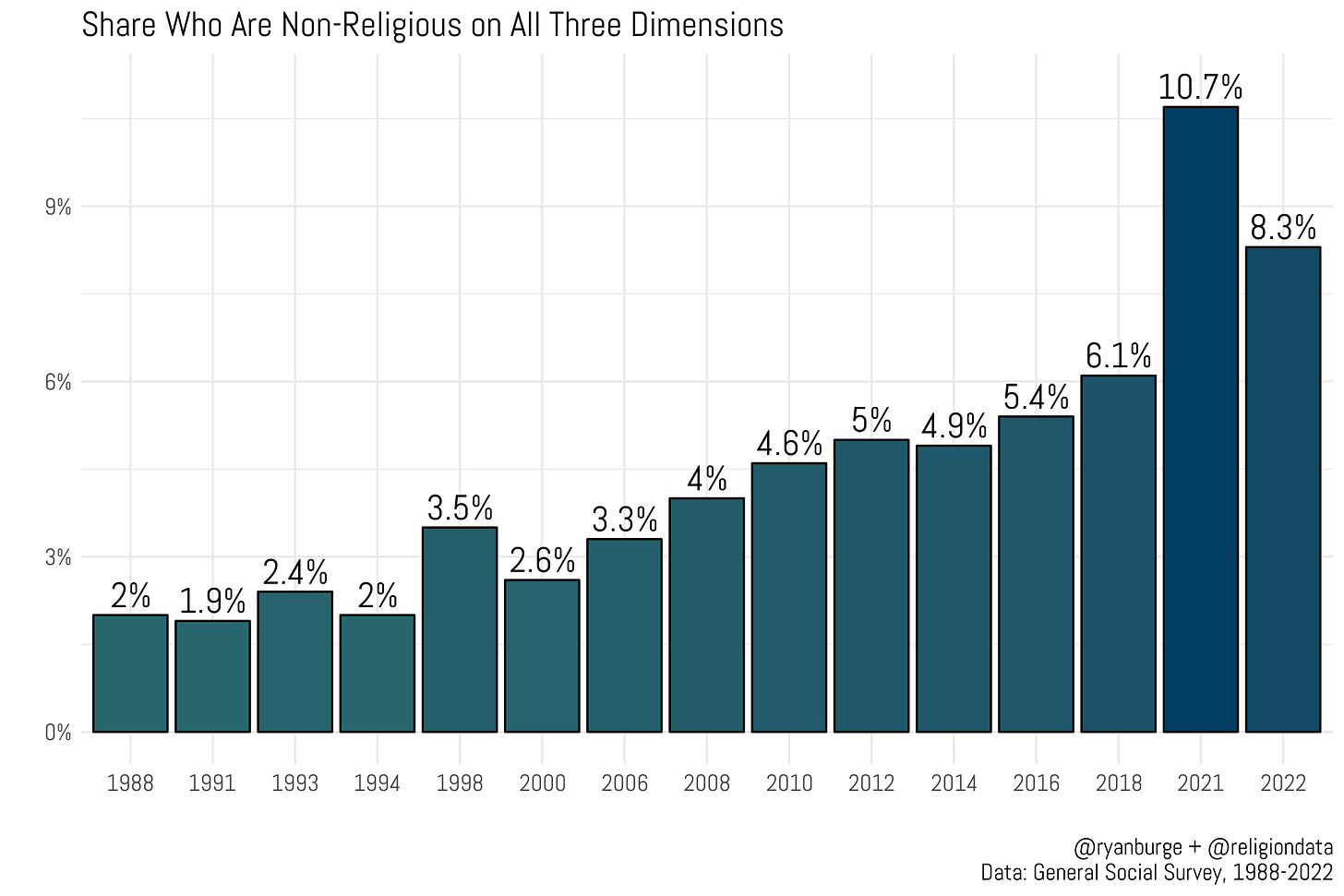
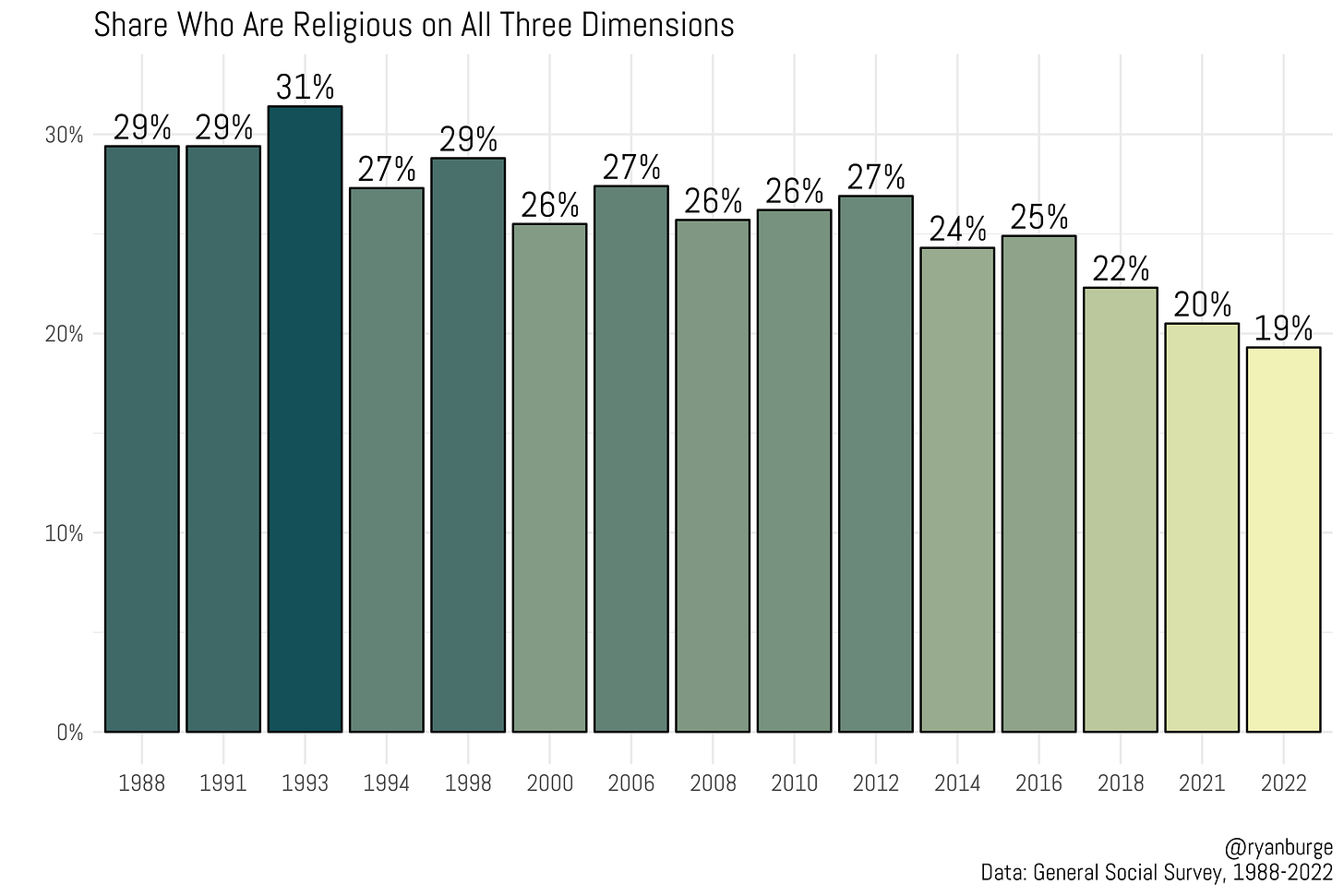
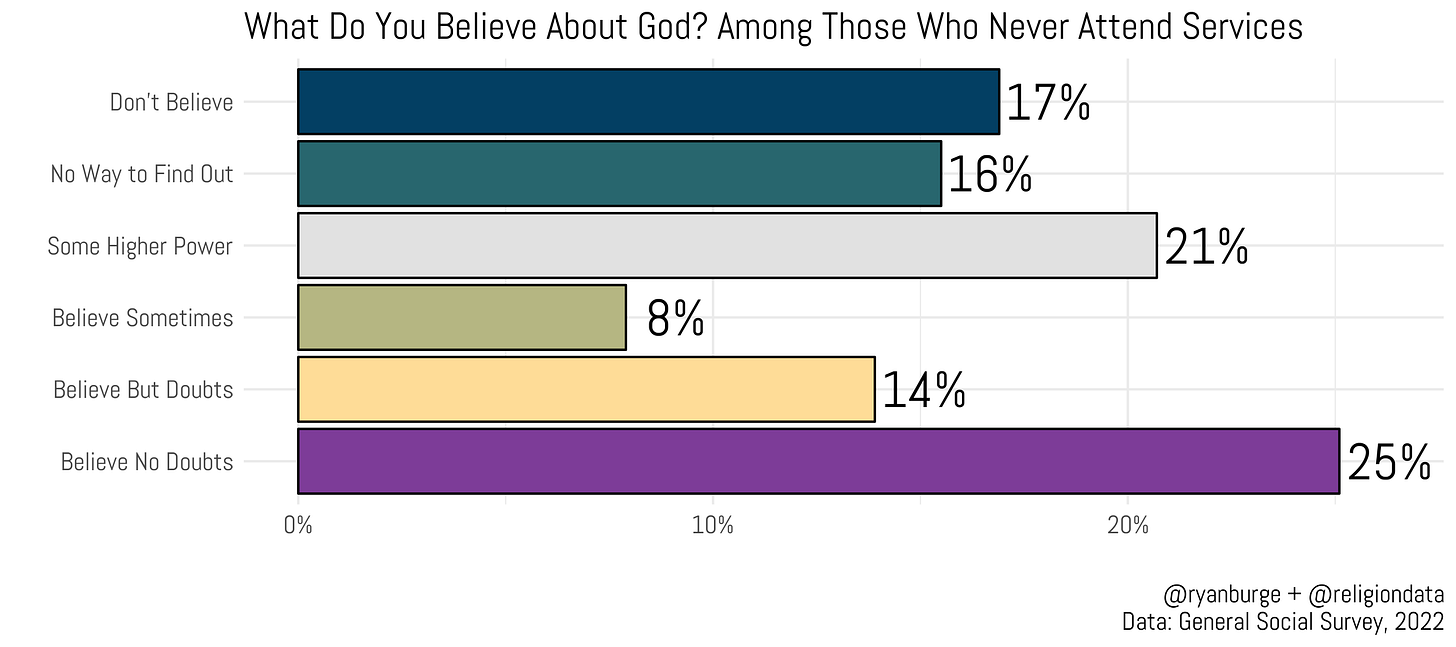
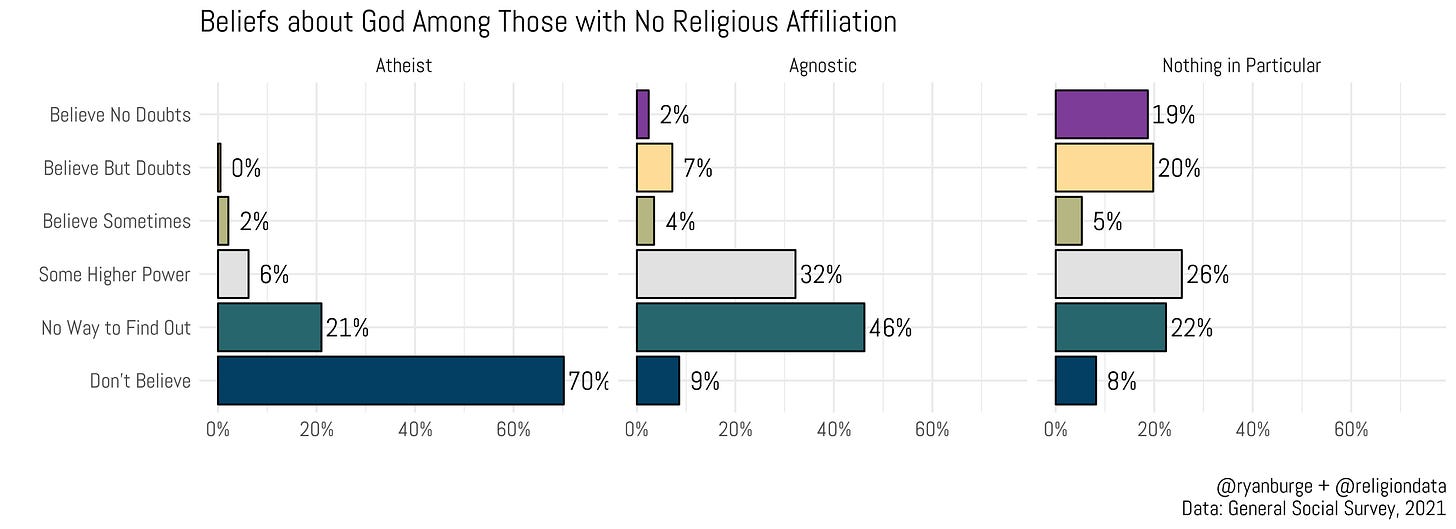
Particularly with agnostics, it may be worth noting the wording of “Which of the following comes closest to expressing what you believe about God?” An agnostic who does not know if God exists and does not know if there is a way to find out will have to pick an option that doesn’t exactly express their beliefs. Exactly which imperfect option they pick could depend on any number of fuzzy personal factors.
Interesting thought about Threads! I have loved being on Threads and have found incredible Christian thinkers and community on there. But you’re right, some very anti-religion thinkers come out of the woodwork real quick and can’t resist commenting on things that really don’t even pertain to them. It’s an interesting dichotomy for sure, but I still enjoy the Christian conversations and community that has been active (variety of different types of Christian thought too).